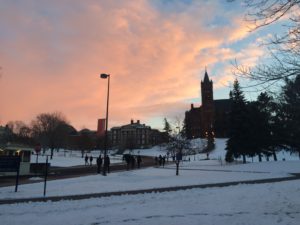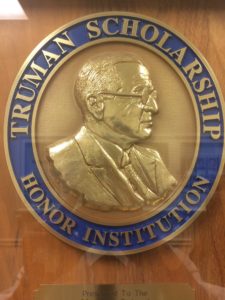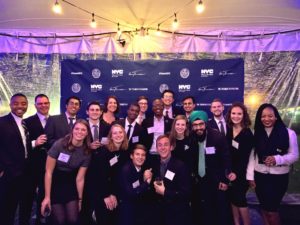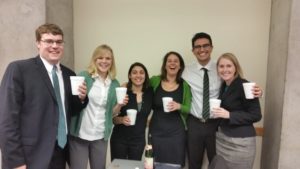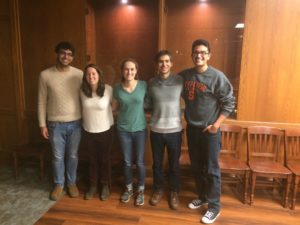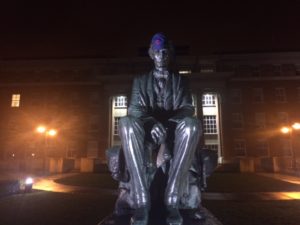It has been a month since the election and many of us are trying to be more understandable of Trump’s supporters. Most of all, we must begin to consider what this means for public servants and what should change in order to fulfill the claims of voters.
One thing is clear, most of us in Maxwell did not support him because of his bigotry. Moreover, some anti-Trump voters compared him with Hitler, on how he said some of the same things than Trump in campaign: He promised to make Germany (America) great again, he proposed mass deportations, he said Jews (Muslims) should wear special ID’s, he blamed Jews (Mexicans) for country’s problems.
Beyond this, there are many reasons why Trump was elected, considering the perceptions of the average voter. First, people want a change, they are not satisfied with the current political system. Therefore, as a political outsider Trump seems more inclined to tell the truth. That is how he is going to investigate Hilary for the 33,000 erased mails, showing why things were nor working as people wanted.
For the average voter, USA is the first world power and should show it. There is the perception that Trump takes what he wants and does not kowtow to foreign weaklings. That he will bring back jobs from China, Japan, and Europe, that selfish multinationals took away from US citizens. Moreover, they want security, and they think that Trump will be tougher with ISIS, and for that he will ally with Putin to crush it faster and better.
Moreover, as a business savvy they think that he will ensure that the country do not continue to pile up debt. While Obama, whose justice beliefs dictate his actions that are geared toward wealth redistribution, Trump is more about wealth creation and personal drive to accumulation. So, he doesn’t buy into the victim mentality: where you’re only entitled to make someone of yourself if you’re a victim with a hard-luck story.
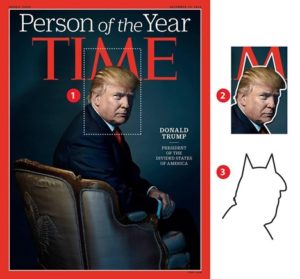
Going back to reality, we can say that some of these issues are illusory, or at least uncertain, but surprisingly others are not. So, I will try to see the bright side of the road, instead of complaining, since time machines are not ready yet. Is not just that Unites States may not be ready for a woman president, is that the Clintons currently represent the geopolitical status quo, and most people is tired of this.
Sadly, anyone knows what Trump really represents, but he shows himself as opposed to globalization, denouncing that it is killing the middle class. He also said that he will take out United States from the NAFTA and the TPP, because for him is a deadly blow for the national manufacturing industry. To the point that in the last 15 years more than 60,000 factories had to close, losing 5 million jobs.
He is showing himself as a true nationalist, but this is not necessarily good, at the point that we can find some resemblances from Hugo Chavez on him if we look closely enough, with obvious differences of course. In this same line, Trump said that he will ban foreign lobbyists fundraising for US elections. Some may even say that he is against the one-world government that Denis Healey, a Bilderberg club (whose members are the 100+ most powerful individuals in the world) founder, described as a single community in 2001. Trump also criticized George Soros in more than one opportunity, who is believed to support Clinton’s campaign with more than $10 million, and before this by her foundation. In addition, he said that he will rise the taxes for hedge funds managers with the restoration of the Glass-Steagall law.
Regardless of how good this could be, Trump (at least based on what he said) is more focused in the economic wealth of his own voters, and this is something that some local social movements understood well. I can imagine what a low middle-class worker could think if they see illegal immigrants taking their jobs away by working for less than minimum salary, it is just not fair.
I am not defending Trump, for now I do not even believe him, I am just saying that some things he said make sense. He represents less politicking and more action, a fresh approach that can be summarized with his phrase: “get things done.” While Trump is designating CEO’s and Generals as officials, Wall street shows its historical maximum because of the optimism that woke up the proposed domestic economic stimulus and the reduction of corporative taxes and regulations: on the first week of December Dow Jones rose 65,19 points.
As I said before, most of us in Maxwell are not happy with the results, but what we should do now is try to focus in what can be done. And above all, try to figure out what can be learned from what happened.
Along with the big picture dynamics, as public servants we should try to get closer to people, to understand what they really need, and what they think about government. Before someone comes and takes advantage of their frustration with more promises than they could handle. We cannot forget that people is not only rational but emotional
Moreover, it is also important to realize that we should not aim only for civic ideals, but for specific solutions for what is really happening. It is a two-way street in which we should not only try to give citizens what the need, but interact with them to figure out together why do they have that needs, or why do they want something else. Showing them what the government can do, why, and what the government should expect from them, rephrasing Obama and Kennedy.
This is how we could aim for and effective government without losing our values, that are the only thing that can guarantee, along with hard work, a sustainable development. It is about trying to bring the best of us, instead of the worst, to get the improvements that we want.
